【新课标】Unit 12 Life is full of the unexpected Setion A 4a-4c课件 (共34张ppt)
文档属性
| 名称 | 【新课标】Unit 12 Life is full of the unexpected Setion A 4a-4c课件 (共34张ppt) | 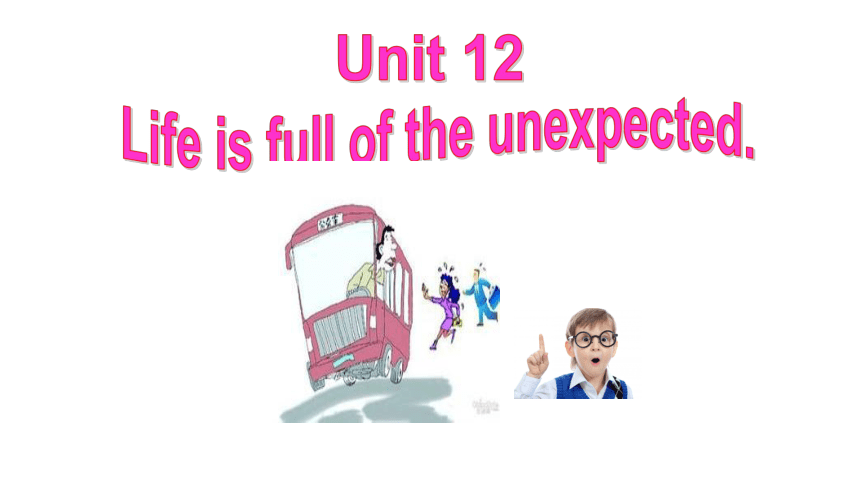 | |
| 格式 | zip | ||
| 文件大小 | 1.0MB | ||
| 资源类型 | 试卷 | ||
| 版本资源 | 人教新目标(Go for it)版 | ||
| 科目 | 英语 | ||
| 更新时间 | 2023-02-15 14:29:38 | ||
图片预览


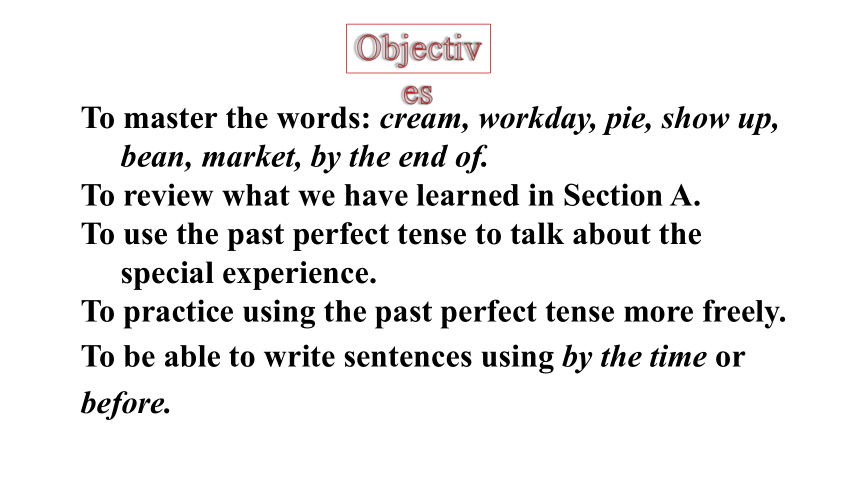

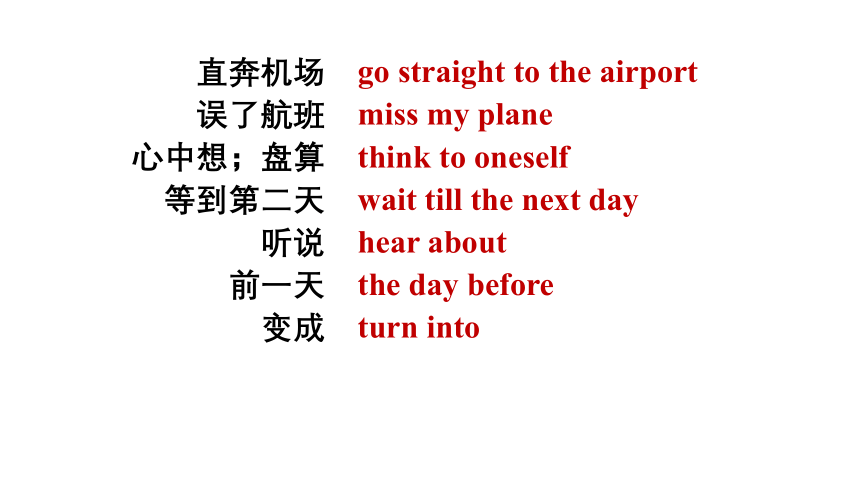
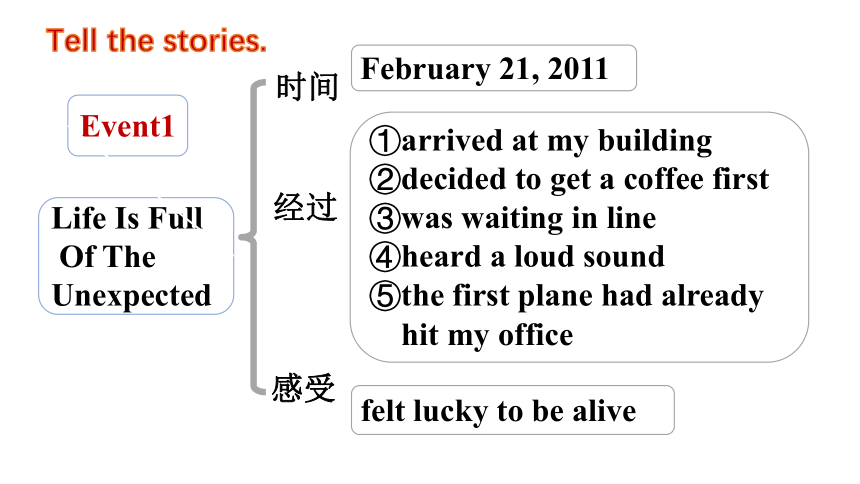
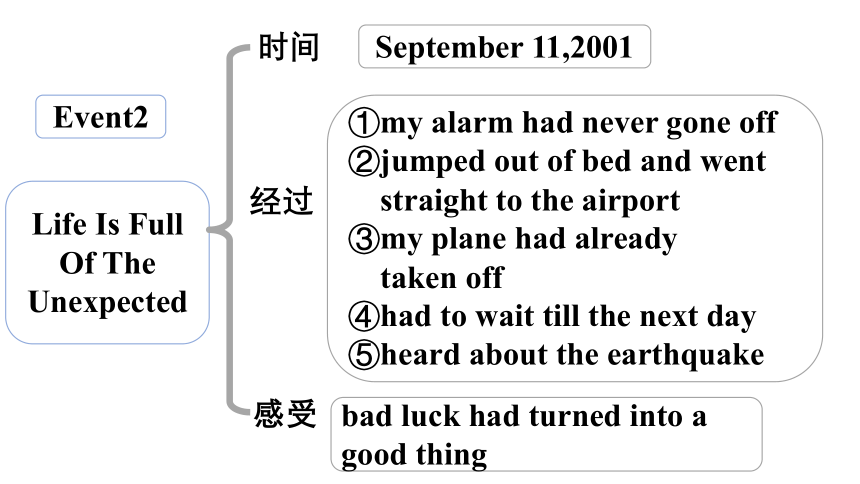
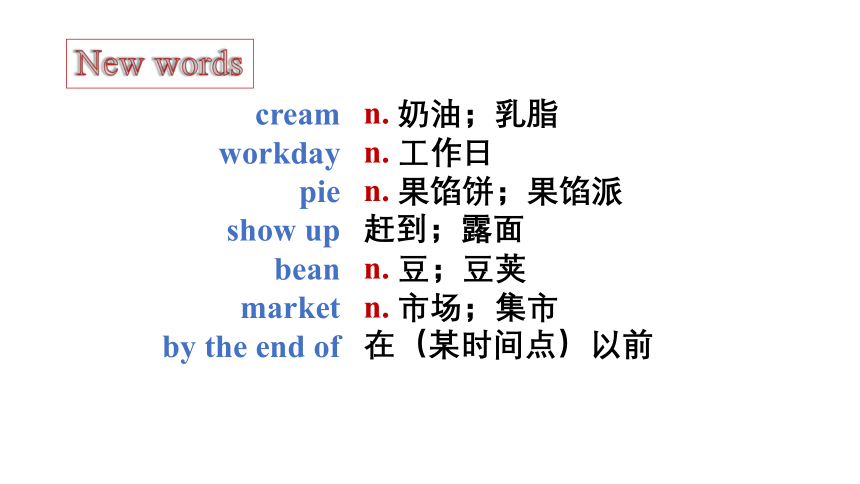
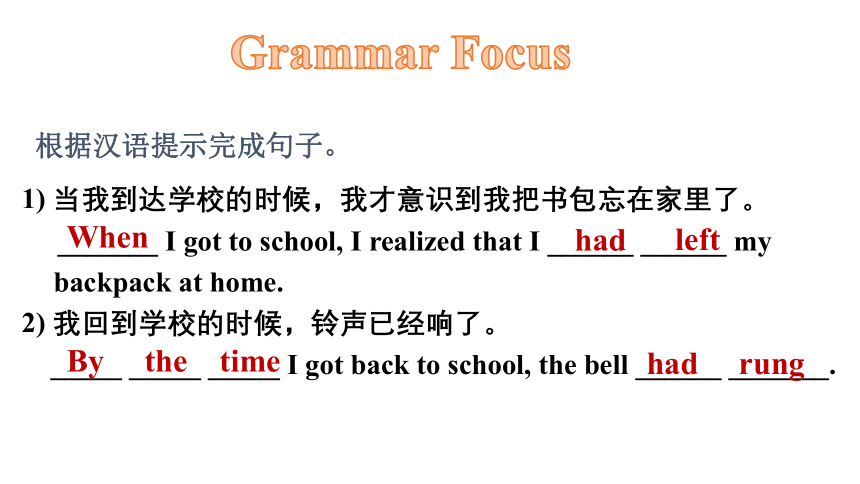
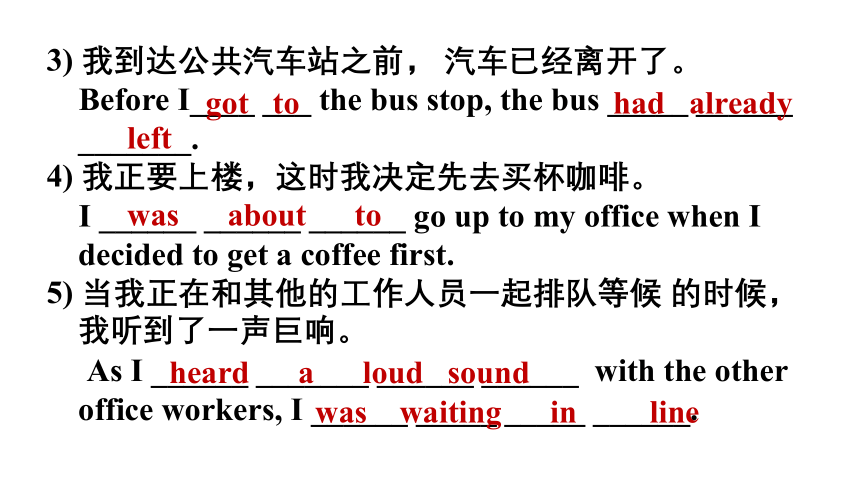
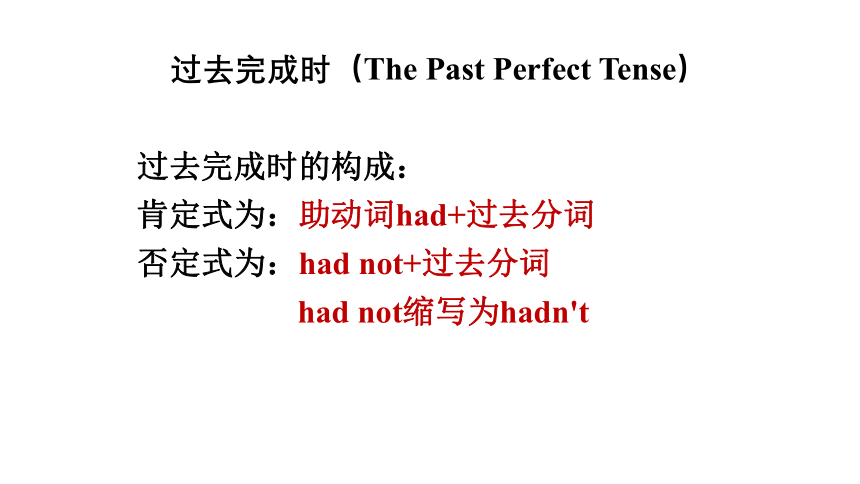
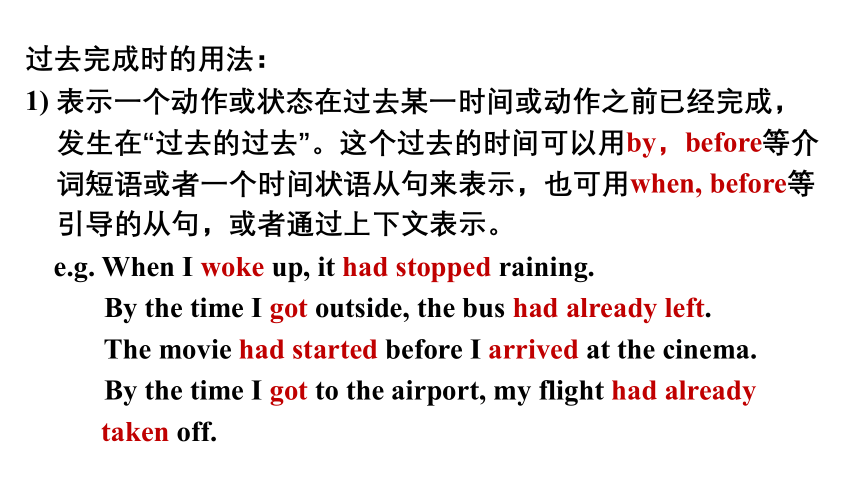
文档简介
(共34张PPT)
Unit 12
Life is full of the unexpected.
Section A
4a-4c
To master the words: cream, workday, pie, show up,
bean, market, by the end of.
To review what we have learned in Section A.
To use the past perfect tense to talk about the
special experience.
To practice using the past perfect tense more freely.
To be able to write sentences using by the time or before.
Objectives
be full of ...
arrive at
be about to do sth.
even though
wait in line with ...
go on
stare at sb. / sth.
in disbelief
jump out of bed
充满……
到达
正要做某事
即使;尽管
与……一起排队等待
继续;发生
盯着某人 / 某物
不信;怀疑地
从床上跳下来
Review
go straight to the airport
miss my plane
think to oneself
wait till the next day
hear about
the day before
turn into
直奔机场
误了航班
心中想;盘算
等到第二天
听说
前一天
变成
Life Is Full
Of The Unexpected
Event1
February 21, 2011
①arrived at my building
②decided to get a coffee first
③was waiting in line
④heard a loud sound
⑤the first plane had already
hit my office
felt lucky to be alive
Tell the stories.
时间
经过
感受
Life Is Full
Of The
Unexpected
Event2
September 11,2001
①my alarm had never gone off
②jumped out of bed and went
straight to the airport
③my plane had already
taken off
④had to wait till the next day
⑤heard about the earthquake
bad luck had turned into a good thing
时间
经过
感受
New words
cream
workday
pie
show up
bean
market
by the end of
n. 奶油;乳脂
n. 工作日
n. 果馅饼;果馅派
赶到;露面
n. 豆;豆荚
n. 市场;集市
在(某时间点)以前
1) 当我到达学校的时候,我才意识到我把书包忘在家里了。
_______ I got to school, I realized that I ______ ______ my backpack at home.
2) 我回到学校的时候,铃声已经响了。
_____ _____ _____ I got back to school, the bell ______ _______.
When
had
left
By the time
had rung
根据汉语提示完成句子。
Grammar Focus
3) 我到达公共汽车站之前, 汽车已经离开了。
Before I____ ___ the bus stop, the bus _____ ______ _______.
4) 我正要上楼,这时我决定先去买杯咖啡。
I ______ ______ ______ go up to my office when I decided to get a coffee first.
5) 当我正在和其他的工作人员一起排队等候 的时候,我听到了一声巨响。
As I ______ _______ ______ ______ with the other office workers, I ______ _____ _____ ______.
was about to
was waiting in line
heard a loud sound
got to
had already
left
过去完成时的构成:
肯定式为:助动词had+过去分词
否定式为:had not+过去分词
had not缩写为hadn't
过去完成时(The Past Perfect Tense)
过去完成时的用法:
1) 表示一个动作或状态在过去某一时间或动作之前已经完成,发生在“过去的过去”。这个过去的时间可以用by,before等介词短语或者一个时间状语从句来表示,也可用when, before等引导的从句,或者通过上下文表示。
e.g. When I woke up, it had stopped raining.
By the time I got outside, the bus had already left.
The movie had started before I arrived at the cinema.
By the time I got to the airport, my flight had already taken off.
2) 表示某一动作或状态在过去某时之前已经开始,一直延续到这一过去的时间。常与时间段连用。
e.g. By the end of last year, she had worked in the factory for twenty years.
Notes: 过去完成时表示的是“过去的过去”,即从过去某一点看,再往前的动作。
过去的过去 过去 现在 将来
过去完成时
现在完成时与过去完成时的区别:
现在完成时表示的动作发生在说话之前某个没有明确说出的过去时间,侧重过去发生的动作对现在产生的影响或造成的结果,与现在有关;
过去完成时的动作发生在“过去的过去”,它是一个相对的时态,不能离开过去的时间而独立存在。
e.g. We have learned 1,000 English words so far.
We had learned 1,000 English words by then.
过去完成时与一般过去时的区别:
过去完成时的动作发生在“过去的过去”,表示过去某一时间发生的动作或存在的状态。
一般过去时表示过去某时间发生的动作或存在的状态。
e.g. After he had done his homework, he went out to play football.
By the time / When I got home, she had locked the door.
by the time 的用法
by the time 意为“到……时候(为止)”,是一个介词短语,在句中常起到连词的作用,引导时间状语从句。
如果从句中的谓语动词是一般过去式,那么主句的谓语动词通常用过去完成时,表示“截止到从句动作发生时,主句动作已经完成,即过去的过去”。
例:By the time you came back, I had finished this book.
你回来时我已经把这本书看完了。
2. 如果从句中的谓语动词为一般现在时或现在完成时,那么从句中的谓语动词常用将来完成时,表示“截止到将来的某一时刻为止,主句动作将已完成。”
例:By the time I get home, they will have left. 我到家时他们将已经离开。
By the time I graduate next year, I will have lived here for five years. 到明年毕业时,我将已经在这待了五年了。
(1) by the end of +时间点意为“到……结束时”
① +过去的时间点,主句用过去完成时;
例:By the end of last year, I had stayed in Xi’an for
seven years. 到去年结束时,我已经在西安待了7年了。
② +将来的时间点, 主句可用将来完成时;
拓展
例:By the end of next month, I will have finished my new book. 到下个月结束时我将要完成我的新书。
(2) by+时间点意为“到……为止;截止……时”
① +现在的时间点,主句用现在完成时;
例:By now, I have finished all my homework.
截止现在,我已经完成了所有的作业。
② +过去的时间点,主句用过去完成时;
例:By yesterday, the building had been completed.
截止昨天,这个建筑就已经完成了。
③ +将来的时间点,主句用将来完成时。
例:By tomorrow, all the students will have been out of the school. 到明天所有的学生都将离校。
Make sentences using by the time or before.
1. Tim went into the bathroom. Mary got up.
By the time Mary got up, Tim had already
gone into the bathroom.
2. The coffee became cold. I put cream (n. 奶
油) in the coffee.
__________________________________
__________________________________
Before I put cream in the coffee, the coffee had become cold.
4a
3. The teacher collected the math homework. I got to school.
__________________________________
__________________________________
4. I completed the work for my boss. The workday (n. 工作日) ended.
__________________________________
__________________________________
By the time I got to school, the teacher had collected the math homework.
I had completed the work for my boss before the workday ended.
5. The movie started. I arrived at the cinema.
__________________________________
__________________________________
6. My mother finished making the apple pie
(n. 果馅派). I got home from my language
course.
__________________________________
__________________________________
The movie had started, before I arrived at the cinema.
By the time I got home from my language course, my mother had finished making the apple pie.
Fill in the blanks with the correct forms of the words in the box.
1. By the time I arrived at the party, everyone else _____ already __________.
2. When he put the noodles into a bowl, he realized he ____________ to add the green beans (n. 豆).
rush out, forget, arrive at, go into,
show up (赶到;露面), find out
showed up
had
had forgotten
4b
3. By the time my mother came back from the market (n. 市场), I ____ already __________ the door to go for my piano lesson.
4. Before she got to the airport, she ____________ about the earthquake.
5. When she _________ the movie theater, she remembered she had forgotten to feed her dog.
6. Before she got a chance to say goodbye, he ____________ the building.
had
rushed out
arrived at
had gone into
had found out
Write two true statements and one false statement about your day yesterday. Then ask your classmates to guess the false statement.
1. By the time I left for school in the morning, __________________________________
__________________________________
__________________________________
I had already had breakfast.
I had already had supper.
I had already had my hair cut.
4c
2. By the end of the school day,
__________________________________
__________________________________
__________________________________
3. By dinner time, I_________________________________
I_________________________________
I_________________________________
I have got a present from Tom.
I had had these articles read.
I had finished my homework.
had had too many apples.
had eaten plenty of meat.
have had all the housework finished.
Language points
Before she got a chance to say goodbye, he had gone into the building. 在她还没来得及告别之前,他已经进入了那栋楼。
get a chance 找到机会
say goodbye to 向某人告别
say hi/hello to 向某人问好
say sorry to 向某人道歉
1. When Tim get back home, he started to realize that the thief ___________ (come) to his house.
2. By the time I received the letter, I ____________ (tell) the content of it.
用括号里所给词的适当形式填空。
had come
had been told
Exercises
By the time the teacher came, we ______ cleaning the classroom.
A. finished B. have finished C. had finished
2. Since 1989, Project Hope ________ millions of young people from poor families achieve their dreams of going to school.
A. will help B. helps C. has helped D. is helping
C
C
3. Sally _______ where she had left the car and the police found it this morning.
A. forgot B. has forgotten
C. forgets D. had forgotten
A
4. Mike_________ the furniture into his new flat this time yesterday.
A. would move B. was moving
C. has moved D. had moved
B
翻译下列句子。
1. 当他到达学校的时候,老师已经开始上课了。
_________________________________
_________________________________
2. 当我出来的时候,我爸爸已经离开家了。
_________________________________
By the time he got to school, the teacher had already started teaching.
When I got outside, my father had left home.
过去完成时的构成:
肯定式为:助动词had+过去分词
否定式为:had not+过去分词
had not缩写为hadn't
Summary
Homework
1. 复习Grammar Focus 中的内容。
Try to make sentences with before,
by the time and be doing … when,
and make use of the past perfect
tense.
2. 写作: 描述一次难忘的经历。
The unexpected is sometimes a chance.
Unit 12
Life is full of the unexpected.
Section A
4a-4c
To master the words: cream, workday, pie, show up,
bean, market, by the end of.
To review what we have learned in Section A.
To use the past perfect tense to talk about the
special experience.
To practice using the past perfect tense more freely.
To be able to write sentences using by the time or before.
Objectives
be full of ...
arrive at
be about to do sth.
even though
wait in line with ...
go on
stare at sb. / sth.
in disbelief
jump out of bed
充满……
到达
正要做某事
即使;尽管
与……一起排队等待
继续;发生
盯着某人 / 某物
不信;怀疑地
从床上跳下来
Review
go straight to the airport
miss my plane
think to oneself
wait till the next day
hear about
the day before
turn into
直奔机场
误了航班
心中想;盘算
等到第二天
听说
前一天
变成
Life Is Full
Of The Unexpected
Event1
February 21, 2011
①arrived at my building
②decided to get a coffee first
③was waiting in line
④heard a loud sound
⑤the first plane had already
hit my office
felt lucky to be alive
Tell the stories.
时间
经过
感受
Life Is Full
Of The
Unexpected
Event2
September 11,2001
①my alarm had never gone off
②jumped out of bed and went
straight to the airport
③my plane had already
taken off
④had to wait till the next day
⑤heard about the earthquake
bad luck had turned into a good thing
时间
经过
感受
New words
cream
workday
pie
show up
bean
market
by the end of
n. 奶油;乳脂
n. 工作日
n. 果馅饼;果馅派
赶到;露面
n. 豆;豆荚
n. 市场;集市
在(某时间点)以前
1) 当我到达学校的时候,我才意识到我把书包忘在家里了。
_______ I got to school, I realized that I ______ ______ my backpack at home.
2) 我回到学校的时候,铃声已经响了。
_____ _____ _____ I got back to school, the bell ______ _______.
When
had
left
By the time
had rung
根据汉语提示完成句子。
Grammar Focus
3) 我到达公共汽车站之前, 汽车已经离开了。
Before I____ ___ the bus stop, the bus _____ ______ _______.
4) 我正要上楼,这时我决定先去买杯咖啡。
I ______ ______ ______ go up to my office when I decided to get a coffee first.
5) 当我正在和其他的工作人员一起排队等候 的时候,我听到了一声巨响。
As I ______ _______ ______ ______ with the other office workers, I ______ _____ _____ ______.
was about to
was waiting in line
heard a loud sound
got to
had already
left
过去完成时的构成:
肯定式为:助动词had+过去分词
否定式为:had not+过去分词
had not缩写为hadn't
过去完成时(The Past Perfect Tense)
过去完成时的用法:
1) 表示一个动作或状态在过去某一时间或动作之前已经完成,发生在“过去的过去”。这个过去的时间可以用by,before等介词短语或者一个时间状语从句来表示,也可用when, before等引导的从句,或者通过上下文表示。
e.g. When I woke up, it had stopped raining.
By the time I got outside, the bus had already left.
The movie had started before I arrived at the cinema.
By the time I got to the airport, my flight had already taken off.
2) 表示某一动作或状态在过去某时之前已经开始,一直延续到这一过去的时间。常与时间段连用。
e.g. By the end of last year, she had worked in the factory for twenty years.
Notes: 过去完成时表示的是“过去的过去”,即从过去某一点看,再往前的动作。
过去的过去 过去 现在 将来
过去完成时
现在完成时与过去完成时的区别:
现在完成时表示的动作发生在说话之前某个没有明确说出的过去时间,侧重过去发生的动作对现在产生的影响或造成的结果,与现在有关;
过去完成时的动作发生在“过去的过去”,它是一个相对的时态,不能离开过去的时间而独立存在。
e.g. We have learned 1,000 English words so far.
We had learned 1,000 English words by then.
过去完成时与一般过去时的区别:
过去完成时的动作发生在“过去的过去”,表示过去某一时间发生的动作或存在的状态。
一般过去时表示过去某时间发生的动作或存在的状态。
e.g. After he had done his homework, he went out to play football.
By the time / When I got home, she had locked the door.
by the time 的用法
by the time 意为“到……时候(为止)”,是一个介词短语,在句中常起到连词的作用,引导时间状语从句。
如果从句中的谓语动词是一般过去式,那么主句的谓语动词通常用过去完成时,表示“截止到从句动作发生时,主句动作已经完成,即过去的过去”。
例:By the time you came back, I had finished this book.
你回来时我已经把这本书看完了。
2. 如果从句中的谓语动词为一般现在时或现在完成时,那么从句中的谓语动词常用将来完成时,表示“截止到将来的某一时刻为止,主句动作将已完成。”
例:By the time I get home, they will have left. 我到家时他们将已经离开。
By the time I graduate next year, I will have lived here for five years. 到明年毕业时,我将已经在这待了五年了。
(1) by the end of +时间点意为“到……结束时”
① +过去的时间点,主句用过去完成时;
例:By the end of last year, I had stayed in Xi’an for
seven years. 到去年结束时,我已经在西安待了7年了。
② +将来的时间点, 主句可用将来完成时;
拓展
例:By the end of next month, I will have finished my new book. 到下个月结束时我将要完成我的新书。
(2) by+时间点意为“到……为止;截止……时”
① +现在的时间点,主句用现在完成时;
例:By now, I have finished all my homework.
截止现在,我已经完成了所有的作业。
② +过去的时间点,主句用过去完成时;
例:By yesterday, the building had been completed.
截止昨天,这个建筑就已经完成了。
③ +将来的时间点,主句用将来完成时。
例:By tomorrow, all the students will have been out of the school. 到明天所有的学生都将离校。
Make sentences using by the time or before.
1. Tim went into the bathroom. Mary got up.
By the time Mary got up, Tim had already
gone into the bathroom.
2. The coffee became cold. I put cream (n. 奶
油) in the coffee.
__________________________________
__________________________________
Before I put cream in the coffee, the coffee had become cold.
4a
3. The teacher collected the math homework. I got to school.
__________________________________
__________________________________
4. I completed the work for my boss. The workday (n. 工作日) ended.
__________________________________
__________________________________
By the time I got to school, the teacher had collected the math homework.
I had completed the work for my boss before the workday ended.
5. The movie started. I arrived at the cinema.
__________________________________
__________________________________
6. My mother finished making the apple pie
(n. 果馅派). I got home from my language
course.
__________________________________
__________________________________
The movie had started, before I arrived at the cinema.
By the time I got home from my language course, my mother had finished making the apple pie.
Fill in the blanks with the correct forms of the words in the box.
1. By the time I arrived at the party, everyone else _____ already __________.
2. When he put the noodles into a bowl, he realized he ____________ to add the green beans (n. 豆).
rush out, forget, arrive at, go into,
show up (赶到;露面), find out
showed up
had
had forgotten
4b
3. By the time my mother came back from the market (n. 市场), I ____ already __________ the door to go for my piano lesson.
4. Before she got to the airport, she ____________ about the earthquake.
5. When she _________ the movie theater, she remembered she had forgotten to feed her dog.
6. Before she got a chance to say goodbye, he ____________ the building.
had
rushed out
arrived at
had gone into
had found out
Write two true statements and one false statement about your day yesterday. Then ask your classmates to guess the false statement.
1. By the time I left for school in the morning, __________________________________
__________________________________
__________________________________
I had already had breakfast.
I had already had supper.
I had already had my hair cut.
4c
2. By the end of the school day,
__________________________________
__________________________________
__________________________________
3. By dinner time, I_________________________________
I_________________________________
I_________________________________
I have got a present from Tom.
I had had these articles read.
I had finished my homework.
had had too many apples.
had eaten plenty of meat.
have had all the housework finished.
Language points
Before she got a chance to say goodbye, he had gone into the building. 在她还没来得及告别之前,他已经进入了那栋楼。
get a chance 找到机会
say goodbye to 向某人告别
say hi/hello to 向某人问好
say sorry to 向某人道歉
1. When Tim get back home, he started to realize that the thief ___________ (come) to his house.
2. By the time I received the letter, I ____________ (tell) the content of it.
用括号里所给词的适当形式填空。
had come
had been told
Exercises
By the time the teacher came, we ______ cleaning the classroom.
A. finished B. have finished C. had finished
2. Since 1989, Project Hope ________ millions of young people from poor families achieve their dreams of going to school.
A. will help B. helps C. has helped D. is helping
C
C
3. Sally _______ where she had left the car and the police found it this morning.
A. forgot B. has forgotten
C. forgets D. had forgotten
A
4. Mike_________ the furniture into his new flat this time yesterday.
A. would move B. was moving
C. has moved D. had moved
B
翻译下列句子。
1. 当他到达学校的时候,老师已经开始上课了。
_________________________________
_________________________________
2. 当我出来的时候,我爸爸已经离开家了。
_________________________________
By the time he got to school, the teacher had already started teaching.
When I got outside, my father had left home.
过去完成时的构成:
肯定式为:助动词had+过去分词
否定式为:had not+过去分词
had not缩写为hadn't
Summary
Homework
1. 复习Grammar Focus 中的内容。
Try to make sentences with before,
by the time and be doing … when,
and make use of the past perfect
tense.
2. 写作: 描述一次难忘的经历。
The unexpected is sometimes a chance.
同课章节目录
- Unit 1 How can we become good learners.
- Section A
- Section B
- Unit 2 I think that mooncakes are delicious!
- Section A
- Section B
- Unit 3 Could you please tell me where the restroom
- Section A
- Section B
- Unit 4 I used to be afraid of the dark.
- Section A
- Section B
- Unit 5 What are the shirts made of?
- Section A
- Section B
- Review of Units 1-5
- Unit 6 When was it invented?
- Section A
- Section B
- Unit 7 Teenagers should be allowed to choose their
- Section A
- Section B
- Unit 8 It must belong to Carla.
- Section A
- Section B
- Unit 9 I like music that I can dance to.
- Section A
- Section B
- Unit 10 You're supposed to shake hands.
- Section A
- Section B
- Review of Units 6-10
- Unit 11 Sad movies make me cry.
- Section A
- Section B
- Unit 12 Life is full of the unexpected
- Section A
- Section B
- Unit 13 We're trying to save the earth!
- Section A
- Section B
- Unit 14 I remember meeting all of you in Grade 7.
- Section A
- Section B
- Review of Units 11-14
